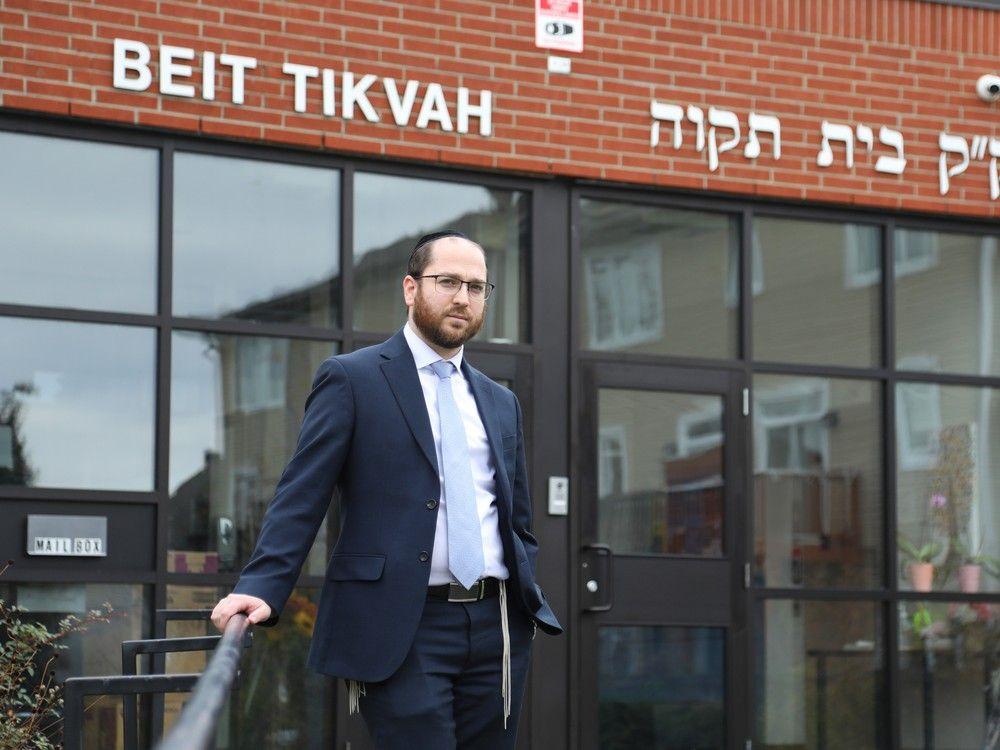
A vile anti-Jewish message was spray painted on a road and a swastika was stuck in a mailbox of a house in Craig Henry earlier this week. Last week, feces was smeared across the front doors of a mosque in Ottawa.
Police and community groups in the city are becoming alarmed at the dramatic rise in hate crimes — against both Israeli-Canadians and Palestinian-Canadians — since the onset of war in Israel and the Gaza Strip on Oct. 7.
That conflict may be 9,000 kilometres away, but the increase in physical and verbal displays of hatred here are directly linked to that conflict.
“There’s definitely an uptick, even just in our community that wasn’t present in the past,” said Rabbi Aryeh Kravetz, whose Beit Tikvah congregation serves the Craig Henry and Centrepointe areas. “It’s more obvious. The messages are becoming more violent, more fearful in quality and quantity.”
Kravetz is deeply concerned that more people are becoming comfortable with openly expressing hatred and intolerance against entire groups. He also recognizes that there has been a rise in Islamophobia since Oct. 7. He was one of 72 faith leaders in Ottawa — Jewish, Muslim and Christian — to sign a joint statement with Mayor Mark Sutcliffe denouncing hatred and discrimination in the city.
“I think we have lost our way a little bit,” he said. “As much as we try to become more tolerant, we’re actually taking more and more steps backwards. The intolerance is growing.”
The National Council of Canadian Muslims says the number of reported and unreported crimes against those with Palestinian heritage has increased dramatically since the Oct. 7 Hamas attack on Israel.
“There has been a tidal wave of repeated incidents, particularly in Ontario,” said director of communications Uthman Quick.
“On a daily basis, we’re seeing multiple cases that are involving our legal teams and our educational teams. It doesn’t seem to be abetting. And the majority of what we (hear) doesn’t go reported. There is a fear of reprisals. People don’t want to make waves. They’re not comfortable with what happened, but they don’t want to go public.”
The Ottawa Police Service says there were 29 reported “hate-motivated” incidents between Oct. 7 and Oct. 23. Twenty-four of those were criminal in nature and the “majority” were linked to the war.
On Wednesday, Chief Eric Stubbs issued a statement to residents, saying police will prosecute to the “full extent of the law” when hate crimes are committed.
“Those incidents can have a lasting impact, not only on those who have been targeted, but through the neighbourhoods and communities where they occur,” read Stubb’s statement.
“The Hate and Crimes Unit fully investigates all reported incidents.”
The police are maintaining an increased presence in areas of cultural and religious significance and at demonstrations.
There are troubling concerns in schools, too.
Students were leaving the Jewish Community School on Tuesday afternoon when a bomb threat was received. Police responded quickly and nobody was reported hurt, but school officials are deeply concerned given the current environment.
“The incident is a tragic reminder that the Jewish community must remain vigilant at a time of increased anti-semitism in not only the Middle East, but also here in Canada and around the world,” said head of school Jon Mitzmacher.
Universities have also become a battle ground, with numerous examples of overt hate on both sides.
“One of the bigger things we’re seeing with Palestinian Canadians in the community is the number of people in university who are afraid to go or afraid to wear cultural symbols (to school) because of the (potential) backlash,” said Quick.
“There have been reports of fear and intimidation from fellow students and outside groups. Even from professors and administrators who are intolerant of freedom of speech.”
The overriding message from the National Council of Canadian Muslims is to call on all educational and political leaders to “create an atmosphere where everyone’s humanity is respected and cherished.”
The Jewish Federation of Ottawa is also condemning violence on all sides.
“We’re importing an external conflict,” said Pauline Colwin, vice-president of communications. “It’s not a Canadian conflict. (The hate crimes) are not representative of Canadian values. It’s not something we should be seeing in Canada, where we practise inclusivity and diversity.”
The saddest part for Rabbi Kravetz is when people are afraid to be themselves.
“Nobody ever wants to hide their identity,” he said.







